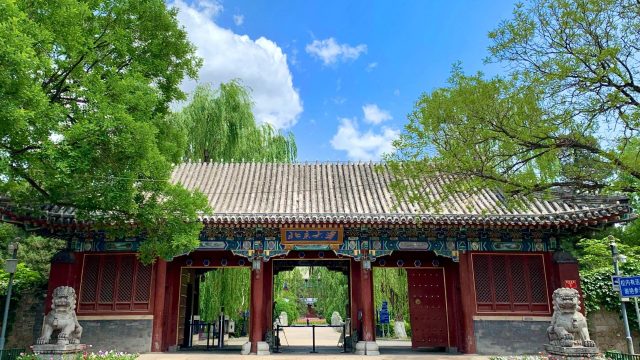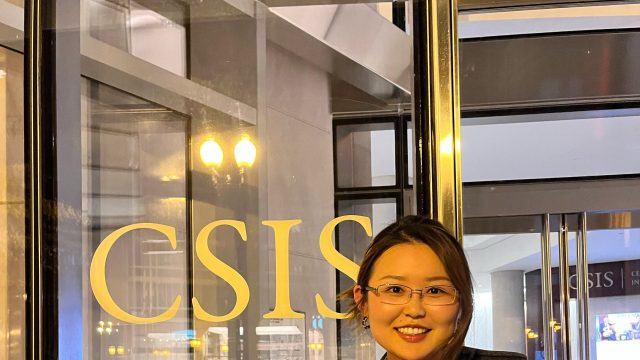Sonia Su (MASIA ’20) is a Research Analyst for Publications at the United States Institute of Peace (USIP) and the founder of Kits to Heart. At USIP, she provides research support for the Publications team on outreach and marketing strategies. She also supports tasks and initiatives related to communications and relationships management, digital platforms, and editorial and production tasks. At Kits to Heart, she curates and distributes cancer kits for patients and their caregivers at hospitals in the Baltimore/Washington Metro Area and nationwide.
While at MASIA, Sonia worked as a research assistant for US-China Strong Foundation, working on issues and organizations related to US-China policy, business, education, and study abroad. During spring 2018, she also served as an associate editor for the Georgetown Journal of Asian Affairs, where she was able to interview China AI expert Elsa Kania.
In addition, after taking his “Korea and the World Powers” course, Sonia worked as Dr. Victor Cha’s teaching assistant in fall 2019. Throughout her time at Georgetown, Sonia served as a graduate member of the Honor Council.
Please tell us about yourself. What led to your interests in Asian Studies?
I was born in Maryland as a daughter of Chinese immigrants who have been able to truly live the American Dream. Growing up, however, I had never felt a strong connection to my heritage—until I spent a semester abroad in Shanghai as an undergraduate student. The experience motivated me to move to China after graduating from Boston University. That year of working in Chinese media and living in Guangzhou made me then realize the depth of my lack of understanding of China and Asia. And with my background in multimedia, I felt strongly about gaining the practical skills, as well as historical and contemporary perspectives, to share the stories of Asia. Ultimately, studying Asia in Washington was the best choice.
How did the Asian Studies Program at Georgetown University prepare you for the challenges and opportunities you face today?
At USIP, I work alongside some of the most respected experts who specialize in global issues and violent conflicts. Georgetown’s Asian Studies Program elevated my level of understanding on such issues, while familiarizing myself with the history behind some of the world’s persistent conflicts and security challenges. At the same time, serving as an associate editor of the Georgetown Journal of Asian Affairs allowed me to experience the process of publishing a peer-reviewed scholarly journal, which has similarities to USIP’s Publications department.
Moreover, many of the reports that USIP publishes focus on Asia, which shows just how important the region continues to be—whether it be the myriad risks faced on the Korean Peninsula, or the role of the Association of Southeast Asian Nations (ASEAN) in maintaining peace and stability. As part of a team that works to publish insightful books and reports based on the Institute’s work around the world, I find that having a better understanding of the background behind these reports adds value to editorial and production tasks.
What specific skills and knowledge did you gain from Asian Studies courses at Georgetown?
From regression analysis to policy memo writing, Asian Studies courses teach valuable skills and are memorable in their own unique ways. Each faculty member brings an incredible wealth of knowledge and experience, often sharing their own experiences of working with key leaders, governments, and organizations around the world. These interactions and memories are priceless. Meanwhile, students learn critical skills that prove to be useful in government, business, academia, and think tanks. As they say, “You don’t know what you don’t know,” and I am grateful for the interdisciplinary nature of Asian Studies courses.
I also believe that my research skills have improved considerably—whether it is writing papers for Professor Kristen Looney’s Chinese Politics course or preparing presentations for Professor Sheila Smith’s Asia’s Nationalisms course. Those also happened to be reading-heavy courses, so I was able to refine the skill of condensing large amounts of information in a concise and informative manner.
What advice would you give to prospective/current students in the Asian Studies Program?
As we all know, things look a little different these days. While in-person interactions are valuable, working remotely still lends itself to many opportunities that may have not existed otherwise. Especially as someone who tends to more introverted, I find that Zoom—while certainly not without its challenges—does make forming connections easier. So if you have not already, I recommend reaching out to people whom you may not have if it were not for this pandemic. You may be surprised at how willing people can be to chat with you and help you out, whether it is regarding your career or academic life.
I cannot say how things will turn out with fully virtual semesters, but from spending half of my last semester virtually, I can say it definitely is not the same, in both positive and negative ways. But take things day by day, and remember that the faculty and staff are always very willing to help and want to see you succeed.
And a final note: Take advantage of the library’s vast resources while you still can! As unbelievable as it may sound now, after you graduate, you may just find that you will miss unlimited access to journal articles and research papers via JSTOR and other databases.


